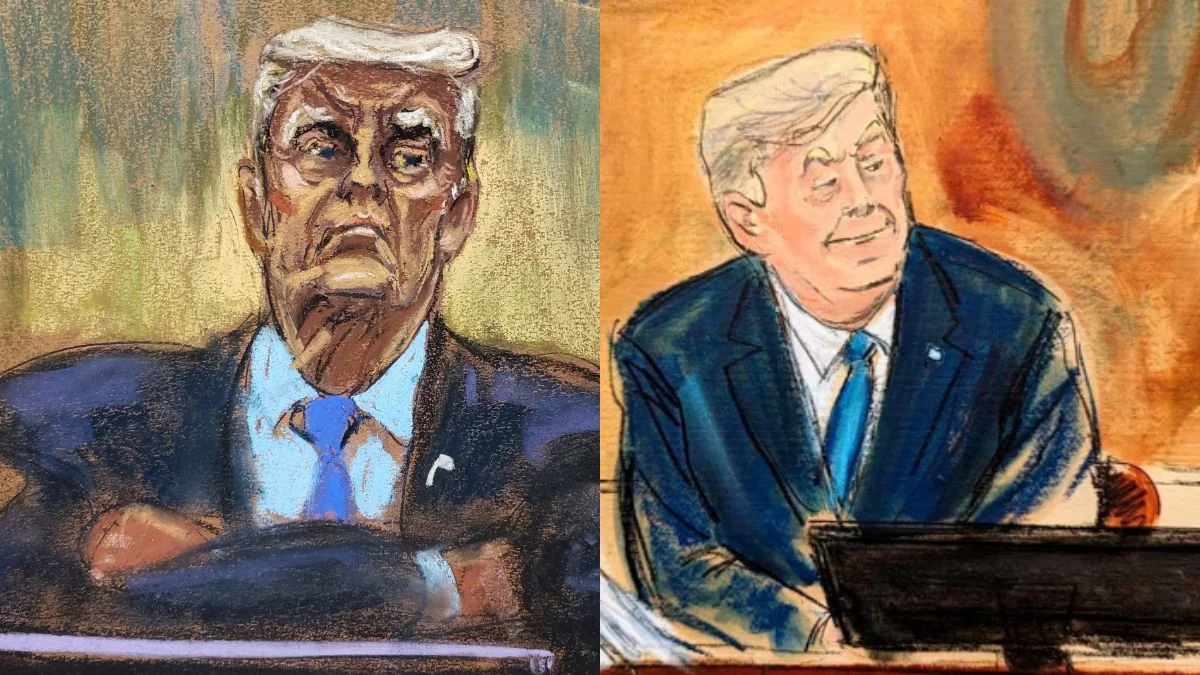Trump Courtroom Sketch Unveiled, the drama unfolding in the courtroom in connection with the $250 million civil fraud trial of former President Donald Trump has taken an unexpected turn as a result of his former White House Press Secretary, Kayleigh McEnany, claiming that the courtroom sketch of Trump is a “travesty.” This article dives deeper into the heated discussion, the larger legal backdrop, as well as the creative problems that courtroom sketch artist Elizabeth Williams was up against.
The Alleged ‘Travesty’ Sketch
The veracity of artistic depictions in high-profile cases has been called into question as a result of McEnany’s critique of the courtroom sketch that was drawn by Elizabeth Williams and commissioned by The Associated Press. The comments made by McEnany, which were broadcast on Fox News, draw attention to the complexities involved in accurately depicting a prominent figure during judicial proceedings.
Artist Elizabeth Williams Responds
Elizabeth Williams, in her reaction to the criticism, concedes that the criticism leveled at her paintings of Donald Trump has only increased since the beginning of his political career. Williams puts attention on the rising tendency of denigrating court artists, putting emphasis on the way in which it has become a fundamental part of their professional work.
Trump’s Legal Battle and Political Ambitions
The civil fraud trial that Donald Trump is currently facing is just one of numerous legal fights that the former president is currently engaged in as he aggressively pursues the candidacy for president of the Republican Party in 2024. This section examines the substance of the $250 million lawsuit, its possible implications for Trump’s corporate empire, as well as the political objectives that Trump believes are behind the legal action.
Trump’s Defenses and Denials
Trump has maintained his not-guilty plea and has adamantly denied any wrongdoing, despite the growing number of legal challenges he is facing. The members of his legal team argue that the charges brought against him have a political motivation. In this part, we will examine Trump’s defense strategy as well as the political environment in which these court battles are taking place.
Courtroom Revelations and Judge Engoron’s Rulings
A summary of the case includes the newest disclosures that came from Trump’s testimony, in which he seemed to admit to manipulating a financial statement to sway Deutsche Bank. In this article, we take a closer look at the pre-trial orders that were handed down by Judge Arthur Engoron, notably the revoking of company licenses and the unusual “corporate death penalty.”
Artistic Challenges in High-Profile Trials
Elizabeth Williams is not the only courtroom sketch artist to come under intense scrutiny; in fact, courtroom sketch artists frequently find themselves at the forefront of public attention. In this part, the difficulties of authentically portraying notable persons in court, the demands placed on artists, and the influence of public opinion on their work are discussed.
SNL, Humor, and Public Reception
Not only did Williams’ courtroom sketches of Trump get criticism, but they also found a home on Saturday Night Live, where they served to inject a dose of comedy into the ongoing legal processes. This section examines the convergence of art, comedy, and public reception, focusing on how cartoons become a part of the larger cultural narrative surrounding a high-profile trial. Specifically, the section investigates how the public’s reaction to the sketches changed over time.
Legal Responses and Future Implications
The answer given by Trump’s legal team to Judge Engoron’s judgments, in which they vowed to appeal, paves the way for further legal conflicts. This section explores the potential ramifications that the continuing trials may have for Trump’s economic endeavors, his political aspirations, and the larger legal environment as a whole.
Conclusion
Trump courtroom sketch, as the drama in the courtroom plays out, the collision of art, politics, and the judicial system grabs the spotlight as the central conflict. The conclusion of the essay draws attention to the complex nature of the trial against Donald Trump. It emphasizes the long-lasting influence that courtroom sketches have and the difficulties that artists confront while working in the midst of a political and judicial upheaval.
ALSO READ: Barron Trump Height Disease: Unraveling the Truth











